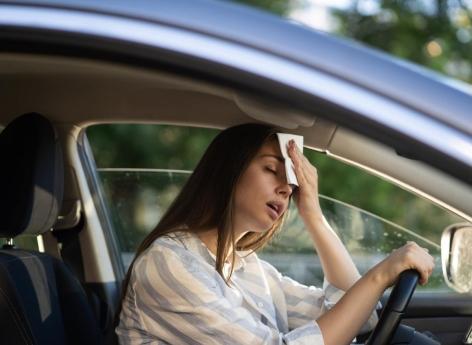While France is experiencing an unusual heat wave episode in June, here are the dangers to be guarded against in the event of very high heat.
Sunburn
In case of excessive exposure to the sun, you can get a sunburn of varying intensity. In the short term, this will result in a painful burn of the skin which can be serious. In the long term, this can promote the development of skin cancer.
To avoid getting a sunburn, it is recommended not to expose yourself between 12 and 4 p.m., and to put sunscreen 50 index every two hours. Also remember to cover sensitive areas of the body (head, ears, lips, feet, breasts, etc.) with clothes, shoes or hats.
The heat stroke
Heat stroke, or “hyperthermia”, is caused by excessive exposure to high heat. It mainly affects children and the elderly and its consequences can be serious (cardiac arrest).
The rise in body temperature is accompanied by a feeling of heat and significant thirst. Headaches may occur, with redness or dryness of the skin, nausea, vomiting, muscle cramps, as well as behavioral and consciousness disorders (drowsiness, fainting).
To avoid hyperthermia, it is recommended not to expose yourself to the sun or heat between 12 and 4 p.m., staying in a cool place. Outside of these hours, wearing a hat outdoors is essential. A lukewarm shower can also help regulate body temperature, as can proper hydration. Also be careful to avoid closed, non-air-conditioned places where the heat can rise very quickly, such as elevators or cars.
The dehydration
Dehydration occurs when the body loses more water than it acquires: during a heat wave, this phenomenon can occur due to a greater evacuation of body fluid through sweat.
Dehydration is especially common in the elderly, children and infants. When mild, it results in thirst, decreased sweating, skin elasticity and urine production, and dry mouth. In severe dehydration, the feeling of thirst may actually be reduced and blood pressure decrease, causing dizziness or fainting, especially when standing. If dehydration continues, it can cause coma, shock and serious damage to internal organs, such as the kidneys, liver and brain. “Brain cells are particularly sensitive to severe dehydration, so confusion is one of the best indicators of severe dehydration”, can we read in the MSD.
To avoid dehydration in periods of high heat, it is recommended to drink two liters of water a day (including coffees, teas and herbal teas). Watch out for fruit juices and sodas, which are very sweet and therefore high in calories, and alcohol, which dehydrates. Energy drinks are excluded.
–

;Resize=(1200,627)&impolicy=perceptual&quality=medium&hash=cce9b6699cd15bb9a90dad3b28d3d46a71620ba94b9d8039a2e50af03a9be6ce)
